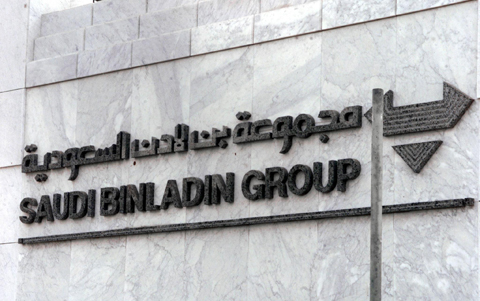 This file photo taken on September 20, 2001 shows the logo of the Saudi BinLadin Group on their headquarters in Jeddah
This file photo taken on September 20, 2001 shows the logo of the Saudi BinLadin Group on their headquarters in JeddahRIYADH: One of Saudi Arabia’s most powerful firms, the Saudi Binladin Group, has laid off 77,000 foreign workers and plans to cut thousands of jobs held by Saudi nationals, a Saudi daily reported yesterday, citing an anonymous company official. Saudi Binladin Group confirmed to AFP that some staff have been let go, but gave no numbers. The unnamed company official cited by Al-Watan said that as of Sunday, 77,000 Binladin Group workers had received exit visas. He added that they were among 200,000 expatriates employed by the company, one of the largest builders in the world.
In addition, 12,000 out of the 17,000 Saudis working for the firm as engineers, administrators and inspectors were expected to be let go, the source said. While Saudi construction companies regularly cut or expand their foreign staff in response to changing demand in the industry, they rarely lay off large numbers of Saudis, partly because it is legally difficult and expensive.
The report in the Al-Watan newspaper is the latest alleging tens of thousands of layoffs, unpaid salaries and unrest by employees of the firm which built some of the Gulf country’s landmarks. Sources in March told AFP that delayed receipts from the government, whose oil revenues collapsed over the past two years, have left employees of the kingdom’s construction giants struggling to survive while they await their salaries. However, Saudi Binladin Group was also sanctioned by the government after a deadly crane accident in Makkah last September. “The size of our workforce is always appropriate to the nature and size of projects and the timeframe they are to be carried out by the group,” Yaseen Alattas, a Saudi Binladin Group spokesman, told AFP.
He said workforce changes would be normal “especially when some projects have ended or are about to end”. Most of the jobs eliminated “are on specified term contracts” for particular projects, Alattas said in an email. “We understand that the reduction of the workforce isn’t easy on everyone. But the Group will continue to implement its obligations towards everyone including the employees it has let go of. They have received their full dues” under the law, said Alattas.
On Friday, Al-Watan reported that 50,000 of the group’s staff were refusing to leave the country while their salaries remained unpaid after more than four months. Another newspaper, Arab News, on Sunday cited Saudi Binladin Group employees as confirming “massive layoffs”. An Arab News report yesterday blamed “unpaid workers” for torching several Binladin Group buses in Makkah over the weekend. Authorities confirmed seven buses were burned but did not give the cause.
Egyptians account for a large percentage of Binladin Group employees. Some complained to Egypt’s labor ministry that their salaries had not been paid for three months, the Arab News reported in March. A well-informed source told AFP in March that “because of delays in payments from the government administration, several companies today have problems... paying both their employees and producers”.
Minister of State Mohammad bin Abdulmalik Al-Sheikh told Bloomberg News in an interview published April 4 “that all or 95 to 98 percent of all arrears will be paid” within two weeks. Saudi Binladin Group was founded more than 80 years ago by the father of Al-Qaeda leader Osama bin Laden, killed five years ago by US Navy Seals. It developed landmarks including the domed Faisaliah Tower in central Riyadh and the Makkah Royal Clock Tower, one of the world’s tallest buildings.
After decades of thriving on lucrative government contracts, the company faced unprecedented scrutiny after one of its cranes working on a major expansion of the Grand Mosque in Makkah, Islam’s holiest site, toppled in September. At least 109 people including foreign pilgrims died, leading King Salman to suspend the firm from new public contracts. This has been a factor in the firm’s economic difficulties, a well-informed source said.
Two Gulf banking industry sources, declining to be named because of commercial sensitivities, said it was believed to owe local and international banks a total of about $30 billion. Bankers said the company had been meeting with banks to reassure them that its loans would be repaid, and that it had brought in outside experts, including foreigners, to beef up its project management and budgeting skills.
Longer-term, bankers say the company may need to restructure debt, and that its size, complexity and presence across the Saudi banking system could make that a difficult process. Some bankers say the company could eventually be broken up or receive fresh capital from the controlling Bin Laden family or even the government, which might act to protect the jobs of Saudi citizens.










